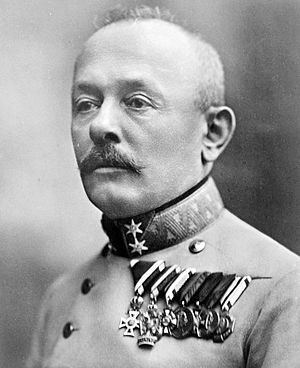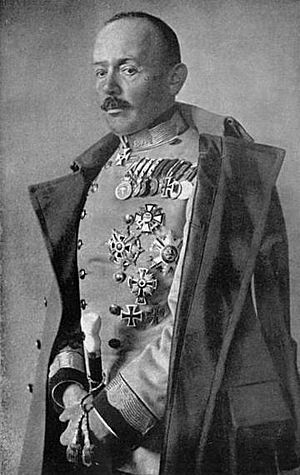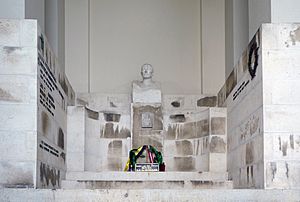Svetozar Boroević facts for kids
Quick facts for kids
K.u.k. Feldmarschall
Svetozar Boroević von Bojna
Svetozar Borojević |
|
|---|---|

Borojević c. 1913
|
|
| Born | 13 December 1856 Umetić, Croatian Military Frontier, Austrian Empire (now Croatia) |
| Died | 23 May 1920 (aged 63) Klagenfurt, Austria |
| Allegiance | |
| Service/ |
Austro-Hungarian Army |
| Years of service | 1872–1918 |
| Rank | Field Marshal |
| Battles/wars |
See battles
|
| Awards | Military Merit Cross, Cross of the Order Star of Romania, Persian Order of the Sun and the Lion, Order of the Iron Crown (Austria), Knights' Cross of the Order of Leopold, Military Order of Maria Theresa |
Svetozar Boroević (born December 13, 1856 – died May 23, 1920) was an important military leader. He was a Field Marshal in the Austro-Hungarian Army. Many people called him one of the best defensive thinkers of World War I. He was also given a special title, Baron Boroëvić von Bojna, for his service. He reached the rank of Field Marshal before World War I ended in 1918.
Contents
Life and Military Career
Early Life and Training
Svetozar Boroević was born on December 13, 1856. His birthplace was the village of Umetić in the Croatian Military Frontier. This area is now part of Croatia. He was baptized in the Eastern Orthodox Church. Some sources say he was of Serb origin, while others say he was Croat. Boroević himself said he was a Croat and that Croatia was his homeland.
He started cadet school when he was just ten years old. After finishing grade school, he studied at military academies in Kamenica and Graz. In 1875, he attended the Liebenau cadet school. After graduating, he became a junior officer in the army.
Rising Through the Ranks
Boroević quickly moved up in the military. He became a corporal in 1872 and a lieutenant in 1875. He fought in battles in Bosnia in 1878. He was recognized for his role in capturing Sarajevo. For his service, he received the Military Merit Cross.
He was promoted to Oberleutnant in 1880. From 1881 to 1883, he studied at a military academy in Vienna. He also worked as an instructor at the Theresian Military Academy until 1891.
In May 1892, he became a major. By May 1895, he was a Lieutenant Colonel. He took command of a battalion in April 1896. In November 1897, he was promoted to Colonel. He became chief of staff for the Seventh Corps in June 1898.
In 1904, Boroević became a Major General. He took control of the 14th Infantry Brigade. In May 1905, he was given a noble title, von Bojna, by the Emperor. From 1907 to 1912, he commanded the VII Landwehr Division. He became Field Marshal Lieutenant in May 1908. In April 1912, he became commander of the Sixth Corps. By May 1913, he was a General of the Infantry.
World War I Service
When World War I began in 1914, Boroević was leading the Sixth Corps. This was on the Eastern Front in Galicia. He showed great skill in these early battles.
On September 1, 1914, he became commander of the Third Army. He fought in the Battle of Komarów. In October, he helped free Przemysl during its siege. His troops then held positions in the Carpathian Mountains. They stopped the Russians from reaching the Danube River.
In early 1915, the Russians tried to push Boroević's Third Army back. But his forces held on long enough for German help to arrive. This saved cities like Budapest. His army then joined a large attack that pushed back the Russians and retook Przemysl.
Defending the Isonzo Front
Boroević's actions impressed Emperor Francis Joseph. On May 25, 1915, he was given command of the Isonzo front. He arrived on May 27 with part of his Third Army.
At Isonzo, Boroević became the commander of the Fifth Army. He built strong defenses against the Italians. His troops stopped eleven Italian attacks. He became known as the Knight of Isonzo in Austria-Hungary. His soldiers called him Naš Sveto! (meaning "Our Sveto!").
For his bravery, he was promoted to Generaloberst in May 1916. In August 1917, he became commander of the Southwestern Front, later called Army Group Boroević. He also fought in the Battle of Caporetto.
In January 1918, he disagreed with plans to split the Austro-Hungarian Army. He became a Field Marshal on February 1, 1918. He also received many awards, including the highest one for Austro-Hungarian soldiers, the Military Order of Maria Theresia. He helped defeat the last Austro-Hungarian attack at the Battle of the Piave River.
The front lines held until October 1918. Then, the Italian army launched a major attack at the Battle of Vittorio Veneto. Non-Austrian troops started leaving their positions as their nations broke away from the empire. Boroević retreated and offered to march on Vienna to stop a revolution. This offer was refused. After the army was demobilized, Boroević retired in December 1918.
After the War
After Austria-Hungary fell apart, Boroević wanted to become a citizen of the new Kingdom of Serbs, Croats and Slovenes. However, he was not welcomed. His personal belongings were taken in Slovenia. Boroević was sad about this treatment. He felt he was "the only field marshal the Southern Slavs had ever produced."
Boroević died in a hospital in Klagenfurt, Austria. His body was moved to Vienna. He was buried in the Central Cemetery. The former emperor, Charles, paid for his grave.
Family Life
Svetozar's father, Adam Boroević, was a border guard officer. His mother was Stana Kovarbašić von Zborište. His father fought in wars in Italy and Hungary. He received a silver medal for bravery. Svetozar's father built a Serbian Orthodox church in Mečenčani.
Svetozar had a brother named Nikola. Nikola was a colonel and also received a noble title in 1917. In 1889, Svetozar married Leontina von Rosner. She was the daughter of an Austrian colonel. They had one son, Friedrich Borojević von Bojna. Friedrich died in 1918.
Honors and Recognition
Honorary Degrees
In 1916, the University of Zagreb gave Svetozar Boroević an honorary degree. This was a Doctor Honoris Causa in social sciences. He received it for his victories and for protecting the rights and culture of Croats. Archduke Eugen also received this honor. The awards were given at the military front.
Honorary Citizenship
Boroević received honorary citizenship from many towns.
- In Croatia:
* Karlovac, 1915. * Sinj, November 1915. A street in Sinj was named after him. * Požega, Slavonski Brod, and Varaždin, November 1915. * Zagreb, March 1916. * Pazin, May 1916. This title was later removed in 1919. * Janjina municipality, May 1917. * Bakar, Koprivnica, Hrvatska Kostajnica, and Petrinja.
- In Slovenia:
* Ljubljana, August 1915. This title was removed in 1919 but returned in 2009. * Ajdovščina (1915), Renče and Goče (1916), Vitovlje (1916), Šempas, Sežana.
See also
 In Spanish: Svetozar Boroević von Bojna para niños
In Spanish: Svetozar Boroević von Bojna para niños



